
views
Ignoring Strangers in Public

Walk away. Anytime you encounter rude or annoying behavior, you have the option of simply walking away from the person. While it's not always possible to get away from someone who's annoying you, it does work in many situations.

Go a different route. If you find you often run into the same annoying person in public, try to avoid that person by going a different way. You may also be able to avoid him or her by going through the area slightly earlier or slightly later.

Don't respond to annoying behavior. When you can't just walk away, the best thing you can do is stay quiet. Staying quiet does not make you weak, and does not make them the "winner." Some people are annoying because they're after a reaction. Don't give them that satisfaction. In addition, not responding helps you regulate your own emotions, so you won't snap on the person or someone else you meet later.
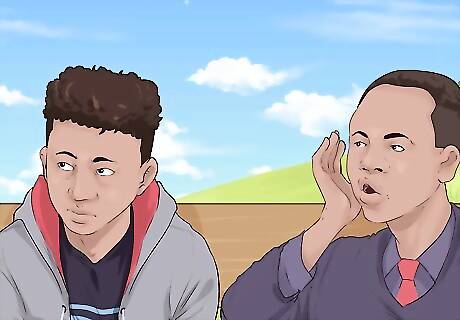
Act like you haven't heard what was said. When a person is speaking, don't give any acknowledgment of having heard him or her. Meaning, don't even incline your head to the person or jump if he or she starts talking more loudly.
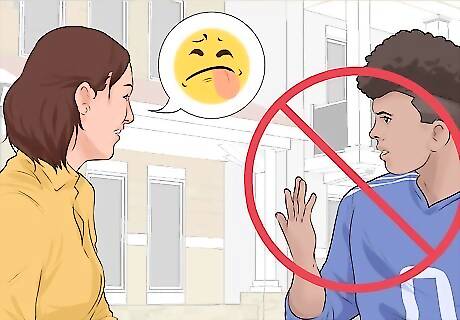
Avoid giving any kind of response, even nonverbal. Even nonverbal responses, such as rolling your eyes or making faces, can egg the person on. Try not to say anything to the person, but also try not to engage the person nonverbally, too. Any kind of gesture that lets them know they're getting to you will only make things worse.
Ignoring Someone at Work or School
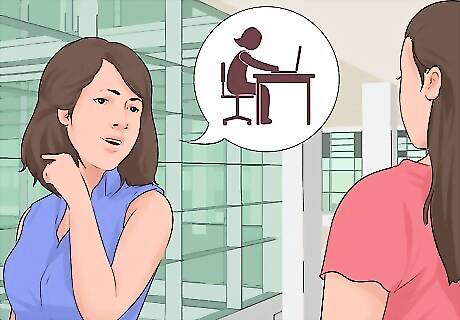
Make yourself unavailable. If you work with someone who annoys you, it may be difficult to ignore them, especially if you're on a team together. However, one way you can get out of spending time with the person is to put the blame on the work you need to get done. For instance, you could say, "I'd love to chat, but I really need to finish this project."
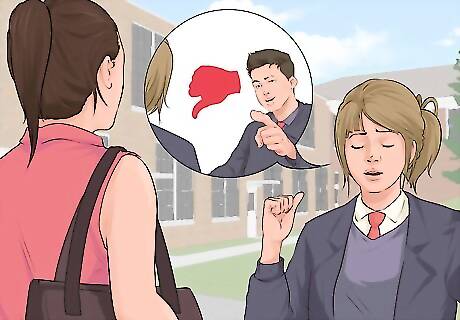
Report bad behavior. Whether you're being bullied at school or someone at work is affecting your productivity, you can and should speak out. At school, talk to an adult. At work, it's a bit more difficult, but try to address the situation with your boss, focusing on how it is affecting the work environment instead of the person's flaws.

Don't walk around alone. If you are at all in fear for your safety, especially if you are being bullied, try to keep a buddy with you. It's much harder for someone to attack or bully you if you're in a group.

Be the bigger person. Ignoring someone who annoys you is different from bad mouthing someone who annoys you. If you want to ignore someone, then follow the maxim "out of sight, out of mind." Don't resort to calling someone names, or being rude in return. When you see someone who annoys you, don't make a big deal about it. Don't talk about them in an attempt to get them to leave you alone. Just keep going about your business, and don't think about that person.
Ignoring Family Members

Acknowledge that you are annoyed. Sometimes, you may not even realize how angry or frustrated you are. You may just find that you're extra stressed. Take a moment to actually notice your annoyance, so you can do something about it or at least move on with what you're doing.

Stop talking to the person. One of the best ways to ignore someone is to simply not engage. Don't talk to the person or engage in any nonverbal way. You can start out by saying that you won't be talking to him or her and then commence with not talking to the person.
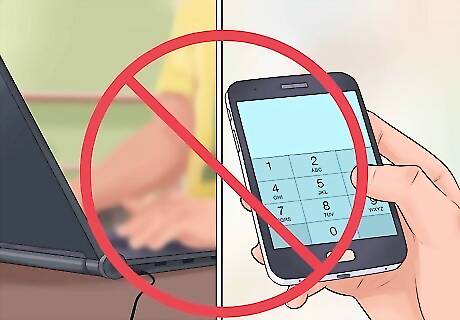
Skip all types of communication. That is, don't answer phone calls or respond to any kind of text-based communications. To truly ignore someone, you must stop all lines of communication. Focus your time and energy on being with the people who are important to you. Also, you should concentrate on being the kind of person you want to be and the type of character you want to live out.

Separate yourself from the person emotionally. If the person is merely bugging you, this step may not be necessary. However, if the person is also criticizing you or getting to you emotionally, you may need to find a way to step back from the person emotionally. In other words, try thinking about placing some kind of mental shield between you and the person. The person may say something negative, but you won't let it reach you. You're not going to take that into yourself. In other words, you hear what's being said, but you reject it's ability to hurt you.

Know that ignoring family members can cause damage. Ignoring someone is basically a form of the silent treatment. When it comes to close relationships, you shouldn't employ this tactic very often. In fact, it can be considered a type of emotional abuse. You are trying to punish the person by not acknowledging him or her instead of trying to work out the issue. Of course, ignoring your whining child or your little brother for five minutes so you can finish cooking dinner is not the same as intentionally employing the silent treatment against your spouse for a day or longer.
Finding Alternatives

Take a break. Sometimes, you just need a moment to collect yourself. That doesn't mean you are ignoring the person. Let the person know that you're going to take a little time to pull yourself together.

Stand up for yourself. That is, you don't have to take any kind of annoying behavior if you can't walk away. Politely address it with the person. With strangers, you can simply ask the person to stop. It may not work. If the situation escalates, don't hesitate to bring in the police if you fear for your safety. With people you know, bring up what the issue is. For instance, you could say, "I find it difficult to work with interruptions. Would you mind if I took a few hours to focus on this project?" You must be clear about what you need and how you expect others to treat you. Don't expect others to read your mind and meet your needs.

Let the person know what's going on in your head. If you're feeling annoyed, it's fine to tell the person that. Just remember to keep it about what you're feeling, rather than blaming the other person. For instance, you could say, "I'm feeling frustrated because I can't get enough work done. I love talking to you, but could we maybe meet up after work sometime and have this conversation?" rather than "You're very annoying when you keep interrupting me." Remember that you are giving information that the other person can choose to ignore or to react negatively. That is their choice, so make sure to reinforce your boundaries.

Take a moment to breathe. When faced with an annoying person, take a minute to calm down. Don't let their annoying behavior get to you. Take a few deep breaths, and try to clear your mind.

Keep things in perspective. Think about what annoyed you. What was it that irritated you? Will it matter tomorrow? More often than not, the thing that annoyed you was a minor offense. Did someone cut you off in traffic? Try to let it go. Expand your perspective when you start to feel annoyed. Don't let little things overwhelm you. When speaking to the annoying person, talk primarily about how you feel and suggest a way to avoid the problem in the future. Avoid blame and criticism for how you feel. Always use "I-statements".

Take responsibility for your emotions. It's possible that the person annoying you is not trying to annoy you at all. Before you let yourself get irritated with someone, take a minute to assess your feelings. If you've been feeling stressed out, it's possible that you are extra irritable. Take a moment to consider whether your emotions are actually related to the situation at hand or whether you're really upset about something else.















Comments
0 comment